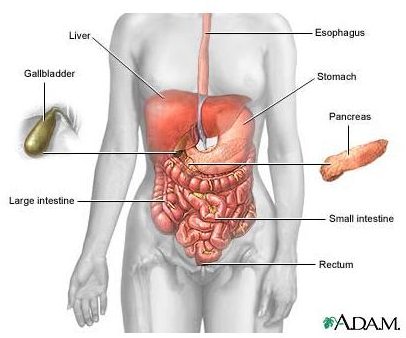Learn about Rectal Cancer Symptoms
What is Rectal Cancer?
The rectum is the final portion of the large intestine (colon) leading to the anus and is about six inches in length. It stores body waste until it is ready to be excreted through the anus. Rectal cancer refers to malignant or cancerous tissue that grows in the wall of the rectum.
The cancer initially begins in the rectum from polyps, or pre-cancerous growths, some of which are capable of becoming malignant. Rectal cancer remains one of the most life-threatening diseases in the world. However, it is treatable and curable. Cancer can expand or metastasize to other organs of the body through the lymphatic system or blood vessel if untreated.
Several risk factors for developing this cancer include a family history of cancer, smoking, high-fat intake, and increasing age (being 40 years old or older). Click on image to enlarge.
The following are several rectal cancer symptoms that might occur:
Constipation
When you find it difficult to defecate because feces become dry and hard, this condition is known as constipation. It might involve feeling uncomfortable and bloated in the stomach. Constipation is considered one of several signs of the presence of cancer, although it does not necessarily indicate a symptom of cancer.
Blood in Feces
Blood in feces causes apprehension because it might indicate some problems inside the bowel, including rectal cancer. Feces might appear bright red, maroon, or black and tarry. However, there can be blood in small quantities in the stool that is not visible known as fecal occult blood. It might signify malignant tumor in the bowel. Therefore, the fecal occult blood test (FOBT) must be immediately performed to detect it, but additional tests are required to tract the source of the bleeding.
Bowel Obstruction
Rectal tumor can get bigger, then it keeps the normal passage of feces from evacuating. The blockage can result in abdominal pain during a bowel movement in addition to constipation. Another sign of the obstruction is the feces might seem narrow and thin because they must pass the rectal tumor that blocks them. If the colon becomes completely obstructed, then vomiting and severe abdominal pain might happen. Eventually, complete constipation will follow it.
Diarrhea
Diarrhea is a common symptom of many medical conditions, but it might be a sign of cancer as well. It is very important to have a thorough examination if you experience this.
Abdominal Discomfort
Abdominal discomfort might include fullness, bloating, cramps, and frequent gas pains.
Weight Loss
Even though you do not exercise regularly nor take the diet, you lose your weight quickly and significantly. In addition, you might lose your appetite. This unknown condition can indicate the presence of cancer. If so, a further medical examination must be performed.
Constant Feeling of Fullness
The tumor might result in a sense of fullness, so you feel like you have consumed a lot of food. It occurs because your body thinks there is something in the bowel that makes you feel satiated. In fact, it is a tumor and it goes nowhere.
References
eMedicinehealth.com: Rectal Cancer - https://www.emedicinehealth.com/rectal_cancer/article_em.htm
The National Cancer Institute: General Information about Rectal Cancer - https://www.cancer.gov/cancertopics/pdq/treatment/rectal/Patient
The Canadian Cancer Society: Signs and Symptoms of Colorectal Cancer - https://info.cancer.ca/cce-ecc/default.aspx?cceid=609&toc=13&Lang=E
Photo Credit
Image courtesy of the National Library of Medicine.
